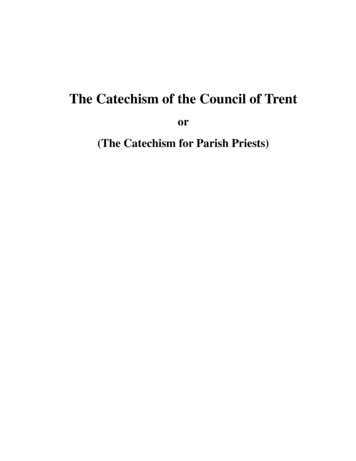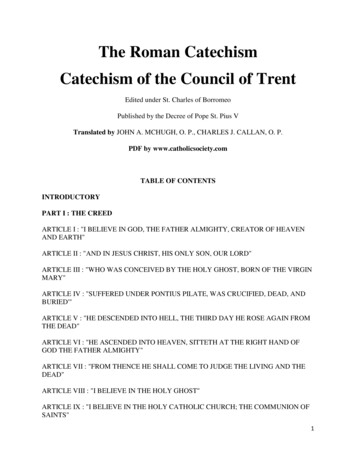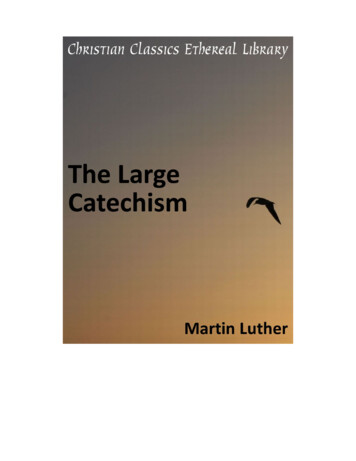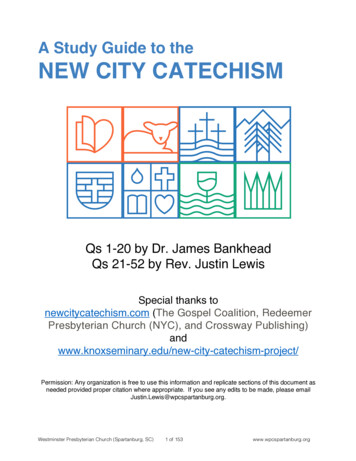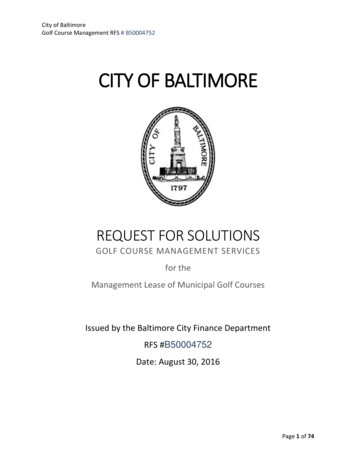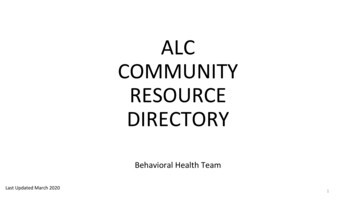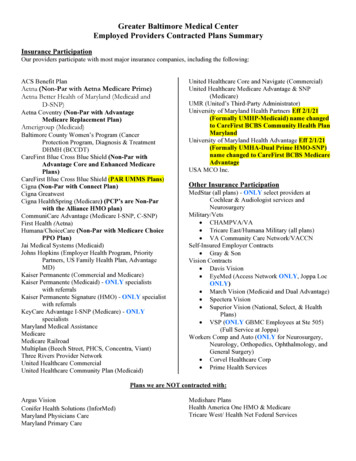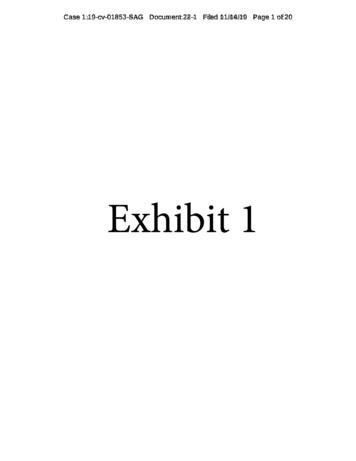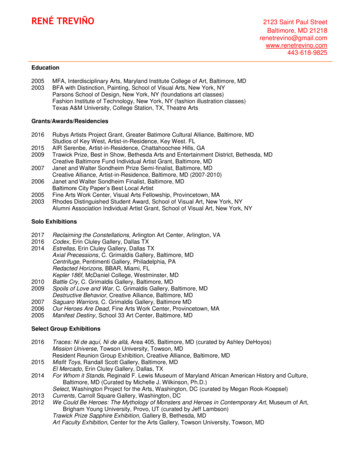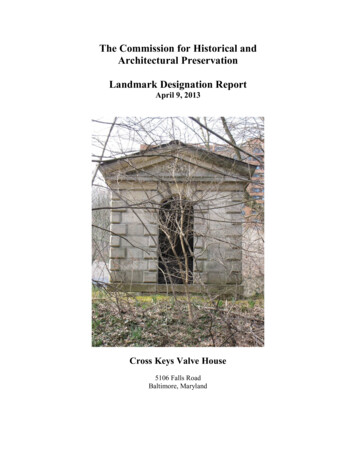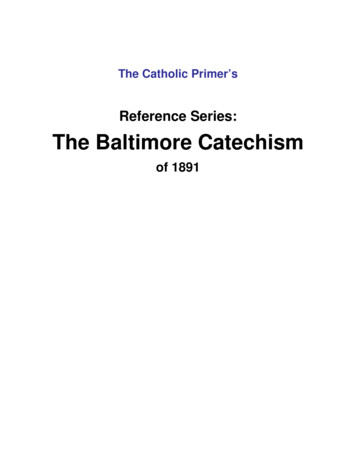
Transcription
The Catholic Primer’sReference Series:The Baltimore Catechismof 1891
Caution regarding printing: This document is over 298 pages in length, depending upon individualprinter settings.The Catholic PrimerCopyright NoticeThe contents The Baltimore Catechism is in the public domain. However, this electronic version is copyrighted. The Catholic Primer, 2005. All Rights Reserved.This electronic version may be distributed free of charge provided that the contents are not altered and this copyright notice isincluded with the distributed copy, provided that the following conditions are adhered to. This electronic document may not beoffered in connection with any other document, product, promotion or other item that is sold, exchange for compensation of any typeor manner, or used as a gift for contributions, including charitable contributions without the express consent of The Catholic Primer.Notwithstanding the preceding, if this product is transferred on CD-ROM, DVD, or other similar storage media, the transferor maycharge for the cost of the media, reasonable shipping expenses, and may request, but not demand, an additional donation not toexceed US 15. Questions concerning this limited license should be directed to webmaster@catholicprimer.org . This documentmay not be distributed in print form without the prior consent of The Catholic Primer.Adobe , Acrobat , and Acrobat Reader are either registered trademarks or trademarks of Adobe Systems Incorporated in theUnited States and/or other countries.The Catholic Primer: www.catholicprimer.org2
Table of ContentsCATECHISM No. 1 . 8LESSON FIRST: ON THE END OF MAN. 8LESSON SECOND: ON GOD AND HIS PERFECTIONS. 9LESSON THIRD: ON THE UNITY AND TRINITY OF GOD . 10LESSON FOURTH: ON THE ANGELS AND OUR FIRST PARENTS . 11LESSON FIFTH: ON SIN AND ITS KINDS. 12LESSON SIXTH: ON THE INCARNATION AND REDEMPTION . 13LESSON SEVENTH: ON OUR LORD'S PASSION, DEATH, RESURRECTION, ANDASCENSION . 14LESSON EIGHTH: ON THE HOLY GHOST AND HIS DESCENT UPON THEAPOSTLES. 14CATECHISM No. 2 . 16LESSON FIRST: ON THE END OF MAN. 16LESSON SECOND: ON GOD AND HIS PERFECTIONS. 17LESSON THIRD: ON THE UNITY AND TRINITY OF GOD . 18LESSON FOURTH: ON CREATION. 20LESSON FIFTH: ON OUR FIRST PARENTS AND THE FALL . 21LESSON SIXTH: ON SIN AND ITS KINDS . 23LESSON SEVENTH: ON THE INCARNATION AND REDEMPTION. 24LESSON EIGHTH: ON OUR LORD'S PASSION, DEATH, RESURRECTION, ANDASCENSION . 26LESSON NINTH: ON THE HOLY GHOST AND HIS DESCENT UPON THEAPOSTLES. 293
LESSON TENTH: ON THE EFFECTS OF THE REDEMPTION . 30LESSON ELEVENTH: ON THE CHURCH . 32LESSON TWELFTH: ON THE ATTRIBUTES AND MARKS OF THE CHURCH. 33LESSON THIRTEENTH: ON THE SACRAMENTS IN GENERAL. 35LESSON FOURTEENTH: ON BAPTISM . 38LESSON FIFTEENTH: ON CONFIRMATION. 40LESSON SIXTEENTH: ON THE GIFTS AND FRUITS OF THE HOLY GHOST . 41LESSON SEVENTEENTH: ON THE SACRAMENT OF PENANCE . 43LESSON EIGHTEENTH: ON CONTRITION . 45LESSON NINETEENTH: ON CONFESSION. 47LESSON TWENTIETH: ON THE MANNER OF MAKING A GOOD CONFESSION49LESSON TWENTY-FIRST: ON INDULGENCES . 50LESSON TWENTY-SECOND: ON THE HOLY EUCHARIST. 51LESSON TWENTY-THIRD: ON THE ENDS FOR WHICH THE HOLY EUCHARISTWAS INSTITUTED. 53LESSON TWENTY-FOURTH: ON THE SACRIFICE OF THE MASS. 55LESSON TWENTY-FIFTH: ON EXTREME UNCTION AND HOLY ORDERS. 57LESSON TWENTY-SIXTH: ON MATRIMONY . 59LESSON TWENTY-SEVENTH: ON THE SACRAMENTALS . 60LESSON TWENTY-EIGHTH: ON PRAYER . 62LESSON TWENTY-NINTH: ON THE COMMANDMENTS OF GOD. 64LESSON THIRTIETH: ON THE FIRST COMMANDMENT . 65LESSON THIRTY-FIRST: THE FIRST COMMANDMENT--ON THE HONOR ANDINVOCATION OF SAINTS . 68LESSON THIRTY-SECOND: FROM THE SECOND TO THE FOURTHCOMMANDMENT . 70LESSON THIRTY-THIRD: FROM THE FOURTH TO THE SEVENTHCOMMANDMENT . 724
LESSON THIRTY-FOURTH: FROM THE SEVENTH TO THE END OF THE TENTHCOMMANDMENT . 74LESSON THIRTY-FIFTH: ON THE FIRST AND SECOND COMMANDMENTS OFTHE CHURCH . 76LESSON THIRTY-SIXTH: ON THE THIRD, FOURTH, FIFTH AND SIXTHCOMMANDMENTS OF THE CHURCH . 78LESSON THIRTY-SEVENTH: ON THE LAST JUDGMENT AND THERESURRECTION, HELL, PURGATORY, AND HEAVEN. 79CATECHISM No. 3 . 82Prayers:. 84The Lord's Prayer. 84The Angelical Salutation. . 84The Apostles' Creed. 84The Confiteor. . 85An Act of Faith. . 85An Act of Hope. . 85An Act of Love. 85An Act of Contrition. . 86The Blessing before Meals. 86Grace after Meals. 86The Manner in which a Lay Person is to Baptize in Case of Necessity: . 86LESSON FIRST: On the End of Man. 86LESSON SECOND: On God and His Perfections. 92LESSON THIRD: On the Unity and Trinity of God. 94LESSON FOURTH: On Creation. 98LESSON FIFTH: On our First Parents and the Fall . 102LESSON SIXTH: On Sin and Its Kinds ON SIN AND ITS KINDS. . 108LESSON SEVENTH: On the Incarnation and Redemption . 1155
LESSON EIGHTH: On Our Lord's Passion, Death, Resurrection, and Ascension . 123LESSON NINTH: On the Holy Ghost and His Descent upon the Apostles . 131LESSON TENTH: On the Effects of the Redemption . 136LESSON ELEVENTH: On the Church . 141LESSON TWELFTH: On the Attributes and Marks of the Church . 146LESSON THIRTEENTH: On the Sacraments in General. 157LESSON FOURTEENTH: On Baptism. 165LESSON FIFTEENTH: On Confirmation. 174LESSON SEVENTEENTH: On the Sacrament of Penance. 183LESSON EIGHTEENTH: On Contrition. 189LESSON NINETEENTH: On Confession. 193LESSON TWENTIETH: On the Manner of Making a Good Confession . 202LESSON TWENTY-FIRST: On Indulgences. 204LESSON TWENTY-SECOND: On the Holy Eucharist . 210LESSON TWENTY-THIRD: On the Ends for Which the Holy Eucharist Was Instituted. 215LESSON TWENTY-FOURTH: On the Sacrifice of the Mass . 219LESSON TWENTY-FIFTH: On Extreme Unction and Holy Orders. 227LESSON TWENTY-SIXTH: On Matrimony . 237LESSON TWENTY-SEVENTH: On the Sacramentals . 246LESSON TWENTY-EIGHTH: [Text Missing] . 256LESSON TWENTY-NINTH: On the Commandments of God. 256LESSON THIRTIETH: On the First Commandment . 259LESSON THIRTY-FIRST: The First Commandment -- On the Honor and Invocation ofthe Saints. 268LESSON THIRTY-SECOND: From the Second to the Fourth Commandment . 273LESSON THIRTY-THIRD: From the Fourth to the Seventh Commandment . 2806
LESSON THIRTY-FOURTH: From the Seventh to the End of the TenthCommandment. 285LESSON THIRTY-FIFTH: On the First and Second Commandments of the Church. 290LESSON THIRTY-SIXTH: On the Third, Fourth, Fifth, and Sixth Commandments ofthe Church . 295LESSON THIRTY-SEVENTH: On the Last Judgment and the Resurrection, Hell,Purgatory, and Heaven. 2997
CATECHISM No. 1LESSON FIRST: ON THE END OF MAN1. Q. Who made the world?A. God made the world.2. Q. Who is God?A. God is the Creator of heaven and earth, and of all things.3. Q. What is man?A. Man is a creature composed of body and soul, and made to the image and likeness of God.6. Q. Why did God make you?A. God made me to know Him, to love Him, and to serve Him in this world, and to be happywith Him for ever in heaven.9. Q. What must we do to save our souls?A. To save our souls, we must worship God by faith, hope, and charity; that is, we must believein Him, hope in Him, and love Him with all our heart.10. Q. How shall we know the things which we are to believe?A. We shall know the things which we are to believe from the Catholic Church, through whichGod speaks to us.11. Q. Where shall we find the chief truths which the Church teaches?A. We shall find the chief truths which the Church teaches in the Apostles' Creed.8
12. Q. Say the Apostles' Creed.A. I believe in God, the Father Almighty, Creator of heaven and earth; and in Jesus Christ,His only Son, our Lord; who was conceived by the Holy Ghost, born of the Virgin Mary,suffered under Pontius Pilate, was crucified; died, and was buried. He descended intohell: the third day He arose again from the dead: He ascended into heaven, and sitteth atthe right hand of God, the Father Almighty; from thence He shall come to judge theliving and the dead. I believe in the Holy Ghost, the Holy Catholic Church, thecommunion of Saints, the forgiveness of sins, the resurrection of the body, and the lifeeverlasting. Amen.LESSON SECOND: ON GOD AND HIS PERFECTIONS13. Q. What is God?A. God is a spirit infinitely perfect.14. Q. Had God a beginningA. God had no beginning; He always was and He always will be.15. Q. Where is God?A. God is everywhere.16. Q. If God is everywhere, why do we not see Him?A. We do not see God, because He is a pure spirit and cannot be seen with bodily eyes.17. Q. Does God see us?A. God sees us and watches over us.18. Q. Does God know all things?A. God knows all things, even our most secret thoughts, words, and actions.9
19. Q. Can God do all things?A. God can do all things, and nothing is hard or impossible to Him.20. Q. Is God just, holy, and merciful?A. God is all just, all holy, all merciful, as He is infinitely perfect.LESSON THIRD: ON THE UNITY AND TRINITY OFGOD21. Q. Is there but one God?A. Yes; there is but one God.22. Q. Why can there be but one God?A. There can be but one God, because God, being supreme and infinite, cannot have an equal.23. Q. How many Persons are there in God?A. In God there are three Divine Persons, really distinct, and equal in all things-the Father, theSon, and the Holy Ghost.24. Q. Is the Father God?A. The Father is God and the first Person of the Blessed Trinity.25. Q. Is the Son God?A. The Son is God and the second Person of the Blessed Trinity.26. Q. Is the Holy Ghost God?A. The Holy Ghost is God and the third Person of the Blessed Trinity.10
27. Q. What is the Blessed Trinity?A. The Blessed Trinity is one God in three Divine Persons.29. Q. Are the three Divine Persons one and the same God?A. The three Divine Persons are one and the same God, having one and the same Divine nature.LESSON FOURTH: ON THE ANGELS AND OUR FIRSTPARENTS34. Q. Which are the chief creatures of God?A. The chief creatures of God are men and angels.35. Q. What are angels?A. Angels are bodiless spirits created to adore and enjoy God in heaven.39. Q. Who were the first man and woman?A. The first man and woman were Adam and Eve.40. Q. Were Adam and Eve innocent and holy when they came from the hand of God?A. Adam and Eve were innocent and holy when they came from the hand of God.43. Q. Did Adam and Eve remain faithful to God?A. Adam and Eve did not remain faithful to God; but broke His command by eating theforbidden fruit.44. Q. What befell Adam and Eve on account of their sin?A. Adam and Eve on account of their sin lost innocence and holiness, and were doomed tomisery and death.11
45. Q. What evil befell us through the disobedience of our first parents?A. Through the disobedience of our first parents we all inherit their sin and punishment, as weshould have shared in their happiness if they had remained faithful.47. Q. What is the sin called which we inherit from our first parents?A. The sin which we inherit from our first parents is called original sin.50. Q. Was any one ever preserved from original sin?A. The Blessed Virgin Mary, through the merit of her Divine Son, was preserved free from theguilt of original sin, and this privilege is called her Immaculate Conception.LESSON FIFTH: ON SIN AND ITS KINDS51. Q. Is original sin the only kind of sin?A. Original sin is not the only kind of sin; there is another kind of sin, which we commitourselves, called actual sin.52. Q. What is actual sin?A. Actual sin is any willful thought, word, deed or omission contrary to the law of God.53. Q. How many kinds of actual sin are there?A. There are two kinds of actual sin-mortal and venial.54. Q. What is mortal sin?A. Mortal sin is a grievous offense against the law of God.57. Q. What is venial sin?A. Venial sin is a slight offense against the law of God in matters of less importance; or inmatters of great importance it is an offence committed with out sufficient reflection or fullconsent of the will.12
59. Q. Which are the chief sources of sin?A. The chief sources of sin are seven: Pride, Covetousness, Lust, Anger, Gluttony, Envy, andSloth; and they are commonly called capital sins.LESSON SIXTH: ON THE INCARNATION ANDREDEMPTION60. Q. Did God abandon man after he fell into sin?A. God did not abandon man after he fell into sin, but promised him a Redeemer, who was tosatisfy for man's sin and reopen to him the gates of heaven.61. Q. Who is the Redeemer?A. Our Blessed Lord and Saviour Jesus Christ is the Redeemer of mankind.62. Q. What do you believe of Jesus Christ?A. I believe that Jesus Christ is the Son of God, the second Person of the Blessed Trinity, trueGod and true man.69. Q. What do you mean by the Incarnation?A. By the Incarnation I mean that the Son of God was made man.70. Q. How was the Son of God made man?A. The Son of God was conceived and made man by the power of the Holy Ghost, in the wombof the Blessed Virgin Mary.74. Q. On what day was the Son of God conceived and made man?A. The Son of God was conceived and made man on Annunciation day-the day on which theangel Gabriel announced to the Blessed Virgin Mary that she was to be the Mother of God.75. Q. On what day was Christ born?A. Christ was born on Christmas day in a stable at Bethlehem, over nineteen hundred years ago.13
LESSON SEVENTH: ON OUR LORD'S PASSION,DEATH, RESURRECTION, AND ASCENSION78. Q. What did Jesus Christ Suffer?A. Jesus Christ suffered a bloody sweat, a cruel scourging, was crowned with thorns, and wascrucified.79. Q. On what clay did Christ die?A. Christ died on Good Friday.83. Q. Why did Christ suffer and die?A. Christ suffered and died for our sins89. Q. On what day did Christ rise from the dead?A. Christ rose from the dead, glorious and immortal, on Easter Sunday, the third day after Hisdeath.91. Q. After Christ had remained forty days on earth, whither did He go?A. After forty days Christ ascended into heaven, and the day on which He ascended into heavenis called Ascension day.LESSON EIGHTH: ON THE HOLY GHOST AND HISDESCENT UPON THE APOSTLES De-scent', the act of coming down. En-a'ble, to make able. En-light'en, to make them understand better. Pen'te-cost, the fiftieth day after Easter.14
Preach, declare publicly, spread by word of mouth. Sanc'ti-fy, to make holy. Strength'en, make strong. Whit'sun-day, white Sunday.94. Q. Who is the Holy Ghost?A. The Holy Ghost is the third Person of the Blessed Trinity.97. Q. On what day did the Holy Ghost come down upon the Apostles?A. The Holy Ghost came down upon the Apostles ten days after the Ascension of our Lord; andthe day on which He came down upon the Apostles is called Whitsunday, or Pentecost.99. Q. Who sent the Holy Ghost upon the Apostles?A. Our Lord Jesus Christ sent the Holy Ghost upon the Apostles.100. Q. Why did Christ send the Holy Ghost?A. Christ sent the Holy Ghost to sanctify His Church, to enlighten and strengthen the Apostles,and to enable them to preach the Gospel.15
CATECHISM No. 2LESSON FIRST: ON THE END OF MAN1. Q. Who made the world?A. God made the world.2. Q. Who is God?A. God is the Creator of heaven and earth, and of all things.3. Q. What is man?A. Man is a creature composed of body and soul, and made to the image and likeness of God.4. Q. Is this likeness in the body or in the soul?A. This likeness is chiefly in the soul.5. Q. How is the soul like to God?A. The soul is like God because it is a spirit that will never die, and has understanding and freewill.6. Q. Why did God make you?A. God made me to know Him, to love Him, and to serve Him in this world, and to be happywith Him forever in the next.7. Q. Of which must we take more care, our soul or our body?A. We must take more care of our soul than of our body.16
8. Q. Why must we take more care of our soul than of our body?A. We must take more care of our soul than of our body, because in losing our soul we lose Godand everlasting happiness.9. Q. What must we do to save our souls?A. To save our souls we must worship God by faith, hope, and charity; that is, we must believein Him, hope in Him, and love Him with all our heart.10. Q. How shall we know the things which we are to believe?A. We shall know the things which we are to believe from the Catholic Church, through whichGod speaks to us.11. Q. Where shall we find the chief truths which the Church teaches?A. We shall find the chief truths which the Church teaches in the Apostles' Creed.12. Q. Say the Apostles' Creed.B. I believe in God, the Father Almighty, Creator of heaven and earth; and in Jesus Christ,His only Son, our Lord; who was conceived by the Holy Ghost, born of the Virgin Mary,suffered under Pontius Pilate, was crucified; died, and was buried. He descended intohell: the third day He arose again from the dead: He ascended into heaven, and sitteth atthe right hand of God, the Father Almighty; from thence He shall come to judge theliving and the dead. I believe in the Holy Ghost, the Holy Catholic Church, thecommunion of Saints, the forgiveness of sins, the resurrection of the body, and the lifeeverlasting. Amen.LESSON SECOND: ON GOD AND HIS PERFECTIONS13. Q. What is God?A. God is a spirit infinitely perfect.17
14. Q. Had God a beginningA. God had no beginning; He always was and He always will be.15. Q. Where is God?A. God is everywhere.16. Q. If God is everywhere, why do we not see Him?A. We do not see God, because He is a pure spirit and cannot be seen with bodily eyes.17. Q. Does God see us?A. God sees us and watches over us.18. Q. Does God know all things?A. God knows all things, even our most secret thoughts, words, and actions.19. Q. Can God do all things?A. God can do all things, and nothing is hard or impossible to Him.20. Q. Is God just, holy, and merciful?A. God is all just, all holy, all merciful, as He is infinitely perfect.LESSON THIRD: ON THE UNITY AND TRINITY OFGOD21. Q. Is there but one God?A. Yes; there is but one God.18
22. Q. Why can there be but one God?A. There can be but one God, because God, being supreme and infinite, cannot have an equal.23. Q. How many Persons are there in God?A. In God there are three Divine Persons, really distinct, and equal in all things-the Father, theSon, and the Holy Ghost.24. Q. Is the Father God?A. The Father is God and the first Person of the Blessed Trinity.25. Q. Is the Son God?A. The Son is God and the second Person of the Blessed Trinity.26. Q. Is the Holy Ghost God?A. The Holy Ghost is God and the third Person of the Blessed Trinity.27. Q. What do you mean by the Blessed Trinity?A. By the Blessed Trinity I mean one God in three Divine Persons.28. Q. Are the three Divine Persons equal in all things?A. The three Divine Persons are equal in all things.29. Q. Are the three Divine Persons one and the same God?A. The three Divine Persons are one and the same God, having one and the same Divine natureand substance.19
30. Q. Can we fully understand how the three Divine Persons are one and the same God?A. We cannot fully understand how the three Divine Persons are one and the same God, becausethis is a mystery.31. Q. What is a mystery?A. A mystery is a truth which we cannot fully understand.LESSON FOURTH: ON CREATION32. Q. Who created heaven and earth, and all things?A. God created heaven and earth, and all things.33. Q. How did God create heaven and earth?A. God created heaven and earth from nothing by His word only; that is, by a single act of Hisall-powerful will.34. Q. Which are the chief creatures of God?A. The chief creatures of God are angels and men.35. Q. What are angels?A. Angels are pure spirits without a body, created to adore and enjoy God in heaven.36. Q. Were the angels created for any other purpose?A. The angels were also created to assist before the throne of God and to minister unto Him; theyhave often been sent as messengers from God to man; and are also appointed our guardians.20
37. Q. Were the angels, as God created them, good and happy?A. The angels, as God created them, were good and happy.38. Q. Did all the angels remain good and happy?A. All the angels did not remain good and happy; many of them sinned and were cast into hell,and these are called devils or bad angels.LESSON FIFTH: ON OUR FIRST PARENTS AND THEFALL39. Q. Who were the first man and woman?A. The first man and woman were Adam and Eve.40. Q. Were Adam and Eve innocent and holy when they came from the hand of God?A. Adam and Eve were innocent and holy when they came from the hand of God.41. Q. Did God give any command to Adam and Eve?A. To try their obedience God commanded Adam and Eve not to eat of a certain fruit whichgrew in the garden of Paradise.42. Q. Which were the chief blessings intended for Adam and Eve had they remainedfaithful to God?A. The chief blessings intended for Adam and Eve, had they remained faithful to God, were aconstant state of happiness in this life and everlasting glory in the next.21
43. Q. Did Adam and Eve remain faithful to God?A. Adam and Eve did not remain faithful to God; but broke His command by eating theforbidden fruit.44. Q. What befell Adam and Eve on account of their sin?A. Adam and Eve, on account of their sin, lost innocence and holiness, and were doomed tosickness and death.45. Q. What evil befell us on account of the disobedience of our first parents?A. On account of the disobedience of our first parents, we all share in their sin and punishment,as we should have shared in their happiness if they had remained faithful.46. Q. What other effects followed from the sin of our first parents?A. Our nature was corrupted by the sin of our first parents, which darkened our understanding,weakened our will, and left in us a strong inclination to evil.47. Q. What is the sin called which we inherit from our first parents?A. The sin which we inherit from our first parents is called original sin.48. Q. Why is this sin called original?A. This sin is called original because it comes down to us from our first parents, and we arebrought into the world with its guilt on our soul.49. Q. Does this corruption of our nature remain in us after original sin is forgiven?A. This corruption of our nature and other punishments remain in us after original sin is forgiven.50. Q. Was any one ever preserved from original sin?A. The Blessed Virgin Mary, through the merits of her Divine Son, was preserved free from theguilt of original sin, and this privilege is called her Immaculate Conception.22
LESSON SIXTH: ON SIN AND ITS KINDS51. Q. Is original sin the only kind of sin?A. Original sin is not the only kind of sin; there is another kind of sin, which we commitourselves, called actual sin.52. Q. What is actual sin?A. Actual sin is any willful thought, word, deed, or omission contrary to the law of God.53. Q. How many kinds of actual sin are there?A. There are two kinds of actual sin-mortal and venial.54. Q. What is mortal sin?A. Mortal sin is a grievous offense against the law of God.55. Q. Why is this sin called mortal?A. This sin is called mortal because it deprives us of spiritual life, which is sanctifying grace, andbrings everlasting death and damnation on the soul.56. Q. How many things are necessary to make a sin mortal?A. To make a sin mortal three things are necessary: a grievous matter, sufficient reflection, andfull consent of the will.57. Q. What is venial sin?A. Venial sin is a slight offense against the law of God in matters of less importance, or inmatters of great importance it is an offense committed without sufficient reflection or fullconsent of the will.23
58. Q. Which are the effects of venial sin?A. The effects of venial sin are the lessening of the love of God in our heart, the making us lessworthy of His help, and the weakening of the power
A. Adam and Eve were innocent and holy when they came from the hand of God. 43. Q. Did Adam and Eve remain faithful to God? A. Adam and Eve did not remain faithful to God; but broke His command by eating the forbidden fruit. 44. Q. What befell Adam and Eve on account of their sin? A. Adam and Eve on account of their sin lost innocence and .
